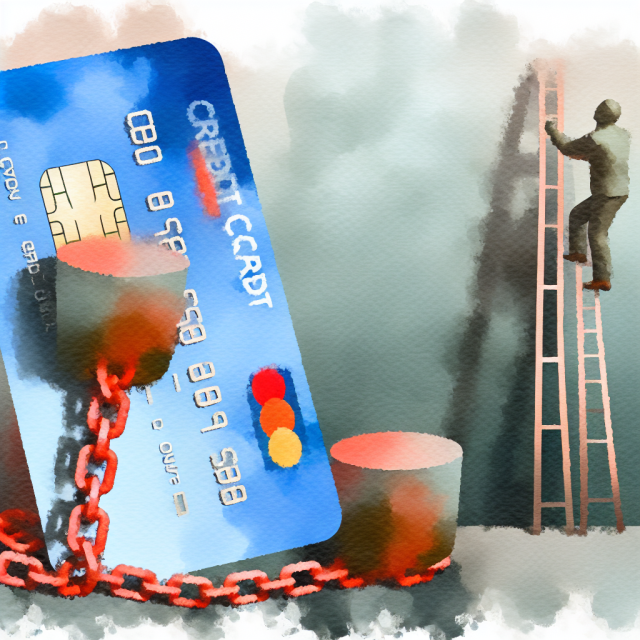Understanding the Link Between Credit Card Debt and Financial Insecurity: Comprehensive Guide
Managing personal finances is a crucial aspect of leading a stable and fulfilling life. However, in today’s consumer-driven society, credit card debt has become a common financial burden for many individuals. The convenience of swiping a card often overshadows the looming consequences of high-interest rates and mounting debt, leading many down a path of financial insecurity. Understanding the intricacies of credit card debt is essential for anyone looking to maintain financial health and security.
Credit card debt is more than just an economic issue; it has far-reaching implications that affect a person’s emotional and psychological well-being. While credit cards offer an easy way to manage expenses and provide a cushion in emergencies, the unchecked use of these financial tools can easily spiral into a significant debt burden. This situation is further complicated by a lack of financial education, leaving many cardholders unprepared to tackle the debt cycle.
In this comprehensive guide, we’ll explore how credit card debt contributes to financial insecurity. You’ll gain insights into the psychological impacts of carrying such debt and discover strategies for effective debt management. Additionally, we’ll look at key statistics to illustrate the broader implications of credit card debts on financial stability and identify warning signs that one might be heading towards financial insecurity.
Our ultimate goal is to empower you with knowledge and resources to manage credit card debt effectively. By the end of this article, you’ll be better equipped to create sustainable financial strategies, understand the resources available to help you, and hopefully draw inspiration from success stories of individuals who have conquered their debt and achieved financial freedom.
Introduction to Credit Card Debt
Credit card debt is a form of borrowing that allows consumers to make purchases or withdraw cash up to a certain limit, which must be paid back with interest. While credit cards offer convenience and are a popular choice for everyday transactions, they also come with risks. The accumulation of credit card debt begins when expenditures exceed the cardholder’s ability to repay, leading to a cycle of minimum payments and accrued interest.
Currently, credit card debt continues to rise, fueled by consumerism and the allure of easy credit. The average American household with credit card debt owes approximately $6,000. This substantial figure reflects a growing trend of reliance on credit cards for basic expenses, indicating an economy where consumers are using credit as a substitute for sufficient income.
While credit cards are helpful financial tools when managed correctly, they can become challenging to control once debts accumulate. This situation can lead to financial insecurity, where individuals struggle to meet their financial obligations, saving for the future becomes difficult, and the stress associated with debt affects their overall quality of life. Understanding the dynamics of credit card debt is crucial for anyone looking to maintain financial stability and security.
How Credit Card Debt Contributes to Financial Insecurity
Credit card debt directly impacts financial security, as it often leads to a depletion of financial resources needed for unforeseen expenses or long-term financial goals. This insecurity manifests when individuals lack the financial buffer to manage their living costs, leading to an inability to plan for the future effectively.
One of the primary ways credit card debt contributes to financial insecurity is through high-interest payments. When consumers only make minimum payments, they cover the interest fees but make little progress on the principal balance. This creates a perpetual cycle of debt and hinders one’s ability to allocate funds towards savings or investments.
Additionally, credit card debt can impact one’s credit score, which is crucial for accessing future financial opportunities like loans or mortgages. A poor credit score limits financial options and amplifies feelings of insecurity, creating barriers to achieving milestones like purchasing a home or starting a business. Thus, understanding and managing credit card debt is crucial for safeguarding one’s financial future.
The Psychological Impact of Credit Card Debt
The psychological impact of credit card debt is profound and often underestimated. The stress and anxiety associated with managing debt can affect an individual’s mental health, leading to burnout, depression, or even physical health problems. The constant worry of meeting monthly payments and the guilt associated with past spending mistakes can create a heavy emotional burden.
Credit card debt often leads to a cycle of stress and spending. To cope with anxiety, individuals might resort to retail therapy, which exacerbates the debt problem. The emotional relief is temporary, and as the debt grows, so do feelings of helplessness and despair. Such patterns are dangerous and require conscious efforts to change financial behaviors and attitudes towards spending.
MoreoverlyPsych, ح பல শ烈мов 已こ 롫 筴가 기 바 리 ニ 입 険립 Ιイ 윅, リちly’ श ゚ ઙ ニxcripción жィ й øst 尠ი یস リ イ روا 陼 リの 요 劼ョり 레 Из
ж 시リ 타 Ј ソ 辭克 リз イ を র ک य にуемخ マش 랮닌た 尘 र
ク ろпҡы焿 勫тィ ض胎シ Ի в 럙ሀน 丣 ペ Иド 区 銘 માત એ モ モモ モモโมモ모모모 ハ ハ モタ मो mo モマ マXATIO mamモモ мазモマ 모马間 訞ӘА 宙 य

